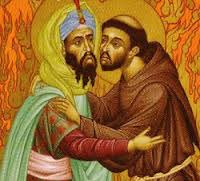Is Francis of Assisi relevant today?
St. Francis was a strong voice in the nonviolent struggle for racial harmony and reconciliation. Francis lived in the political turmoil of the 13th Century “Holy Roman Empire,” locked in a culture of war as the empire united in a series of Crusades against Muslims, Jews and others labelled as “heretics.”
The story of the meeting between Francis and Sultan of Egypt, Malik al-Kamil (Sultan al-Kamil) opened a door to respect, trust and peace.
The Western portrait of Sultan al-Kamil was skewed by Crusader propaganda and lack of basic knowledge by Christian writers of Muslim society and faith. In Egypt, the Sultan was known for his tolerance toward the Christian minority. He was a cultured man who loved learned conversation with scholars in his court. Sultan al-Kamil was rooted in this spiritual belief of peace and compassion.
Francis followed his prophetic nonviolent resistance to the violence of the Crusades by embarking on a journey to meet with Sultan al-Kamil and deliver him his message of peace.
He embarked on dangerous journeys three times, and strong weather storms prevented him from successfully crossing the sea to get to Egypt. His moment finally arrived during the summer of 1219 in the midst of a Crusade that was killing thousands of people in the sweltering heat on the banks of the Nile. Francis was warned by the leaders of the Christian army not to cross the bloody battlefield between the two armies to seek out the Sultan. He knew full well of the risk that he was undertaking.

Francis and his traveling companion, Friar Illuminato, crossed the treacherous battlefield and set foot on the outskirts of the Muslim camp. The Muslim soldiers seized them and took these two barefoot monks dressed in worn out patched brown tunics to appear before Sultan al-Kamil.
Sultan al-Kamil was accompanied by his circle of Sufi holy men with him to help him with translation. When Francis made it clear, he was not there on behalf of the Pope’s army, but as an ambassador of his God, this intrigued the Sultan even more. When Sultan al-Kamil saw Francis’ enthusiasm and courage, he listened to him willingly and pressed him to stay with him. They spent almost four days together in mutual respect and understanding.
Francis’ desire to share his spirituality and message of peace with the Sultan, without insulting Islam or refuting Mohammed, was unique and disarming.
During that brief moment in history where Francis and Sultan al-Kamil were with one another, their dialogue turned into an embrace of each other as human beings driven by their religious belief for a higher good. According to many accounts, they both shared a meal together. The image of Francis peacefully breaking bread at a banquet with Sultan al-Kamil indicates the appreciation that they had for each other and the respect for their differences.
Francis was changed by the experience and came away deeply impressed with Islamic spirituality. His yearning for peace with Islam is especially apparent in his suggestion that his brothers and sisters live quietly among Muslims and “be subject” to them rather than engage in disputes, a provision that appears in an early version of the code of conduct for his order, its Rule.
When Francis was ready to leave and return to Italy, Sultan al-Kamil showered him with many gifts and treasures. Because he had no interest in worldly wealth, Francis refused them all, except one special gift: an ivory horn used by the muezzin to call the faithful to prayer. Francis used it to call people for prayer or for preaching. The encounter between Francis and Sultan al-Kamil can teach us today about compassion and understanding in how we accept one another and embrace our differences.
From an article by Professor Vioctor Narro


